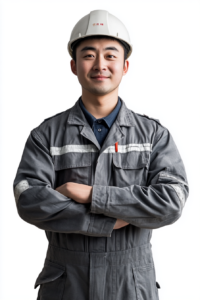Reservoir engineers are technical specialists who use their expertise in geological and engineering principles to evaluate reservoir characteristics, create predictive models, and design effective production strategies. Reservoir engineers assist with decision-making regarding well placement, production rates, and enhanced recovery techniques.

Educational Requirements and Qualifications
Necessary Degrees and Certifications
A bachelor’s degree in petroleum engineering, geology, geophysics, or a related field is typically required for entry-level reservoir engineering positions. Advanced degrees, such as a master’s or Ph.D., can be advantageous for career advancement and specialisation in areas like reservoir simulation, enhanced oil recovery, or unconventional resources.
Professional certifications, such as those offered by the Society of Petroleum Engineers (SPE), can demonstrate your expertise and commitment to professional development.
Relevant Courses and Training
To enhance your knowledge and skills as a reservoir engineer, consider pursuing specialised courses like our Gas Lift Systems Design, Operation, and Optimisation training.
This comprehensive course equips reservoir engineers with the expertise to design, operate, troubleshoot, and optimise gas lift systems, a common artificial lift method used to enhance production in mature or low-pressure reservoirs.
By understanding gas lift principles and applications, you’ll be able to make informed decisions regarding well performance and production optimisation.
Key Skills and Competencies
Technical Skills
- Reservoir Characterisation: Analysing geological and petrophysical data to understand reservoir properties and fluid distribution.
- Reservoir Modelling: Building simulation models to predict reservoir behaviour and production performance under various scenarios.
- Production Forecasting: Estimating oil and gas production rates based on reservoir characteristics and operational parameters.
- Well Performance Analysis: Evaluating well productivity, identifying potential issues, and recommending optimisation strategies.
- Software Proficiency: Using specialised software tools for reservoir simulation, data analysis, and production forecasting.
Soft Skills
- Critical Thinking and Problem Solving: Analysing complex data, identifying trends, and developing innovative solutions to reservoir challenges.
- Communication and Collaboration: Effectively communicating technical information to diverse stakeholders and collaborating with cross-functional teams.
- Project Management: Planning, organising, and executing reservoir engineering projects within budget and timeline constraints.
- Adaptability: Thriving in a dynamic industry environment and adapting to changing technologies and operational requirements.
- Decision-Making: Making informed decisions based on data analysis, technical expertise, and sound judgment.
Job Responsibilities and Daily Tasks
Reservoir Characterisation and Modelling
- Analysing geological data: Interpreting well logs, seismic surveys, and core samples to understand reservoir structure, rock properties, and fluid distribution.
- Building reservoir models: Developing computer simulations to predict reservoir behaviour and production performance under different scenarios.
- Updating models: Integrating new data and refining models to improve accuracy and predictive capabilities.
Production Forecasting
- Estimating production rates: Predicting oil and gas production volumes over time, considering reservoir characteristics, well performance, and operational constraints.
- Identifying optimisation opportunities: Analysing production data, well tests, and simulation results to identify potential improvements in production strategies.
- Recommending well interventions: Proposing solutions like well stimulation, artificial lift, or workovers to enhance production rates.
Well Planning and Field Development
- Determining well placement: Analysing reservoir data to identify optimal locations for drilling new wells.
- Designing well completion strategies: Selecting appropriate completion methods and equipment to maximise production and minimise risk.
- Evaluating field development plans: Assessing the technical and economic feasibility of different development scenarios.
Reservoir Management and Surveillance
- Monitoring reservoir performance: Tracking production data, pressure trends, and fluid behaviour to ensure optimal reservoir management.
- Implementing enhanced oil recovery (EOR) techniques: Evaluating and applying EOR methods (e.g., waterflooding, gas injection) to maximise hydrocarbon recovery.
- Mitigating reservoir risks: Identifying and addressing potential issues like water or gas breakthrough, pressure depletion, or formation damage.

Salary Expectations and Career Growth
Entry-Level vs. Experienced Salaries
Entry-level positions typically range from £43,000 to £72,000 per year, while senior reservoir engineers earn an average of £85,000 per year. Your salary will grow as you gain experience and demonstrate your value to your employer.
Career Advancement Opportunities
With continued professional development, reservoir engineers can advance to various senior roles, including:
- Lead Reservoir Engineer: Overseeing a team of reservoir engineers and managing multiple projects.
- Reservoir Engineering Manager: Leading the reservoir engineering department and providing strategic direction for reservoir management activities.
- Consultant: Providing expert advice and technical services to oil and gas companies on reservoir engineering issues.
- Technical Specialist: Focusing on a specific area of expertise, such as reservoir simulation, unconventional resources, or EOR.
- Project Manager: Leading and coordinating multidisciplinary teams in the planning and execution of oil and gas projects.
How the Gas Lift Systems Design, Operation, and Optimisation Course Can Help
Course Content and Benefits
Our Gas Lift Systems Design, Operation, and Optimisation course provides a deep dive into the world of artificial lift, focusing on gas lift as a key technique for enhancing production in mature or low-pressure reservoirs.
Through real-world case studies and practical exercises, you’ll gain hands-on experience in designing and optimising gas lift systems, analysing production data, and troubleshooting common issues. The course also explores the latest advancements in gas lift technology, equipping you with the knowledge to implement innovative solutions and improve operational efficiency.
- Introduction to Gas Lift: Understand the fundamental principles, components, and applications of gas lift systems in oil and gas production.
- Artificial Lift Activities: Explore the various artificial lift methods employed during gas lifting operations.
- Gas Lifting Benefits: Analyse the advantages and limitations of gas lift, and assess its sustainability in different reservoir conditions.
- Case Studies in Gas Lift Optimisation: Learn from real-world examples to gain insights into successful gas lift optimisation strategies.
- Gas Lift System Design: Master the principles of designing efficient and effective gas lift systems, including equipment selection, injection rate optimisation, and consideration of well and reservoir characteristics.
- Troubleshooting Techniques: Develop proficiency in diagnosing and resolving common issues in gas lift operations, ensuring optimal performance and minimising downtime.
- Optimisation Strategies: Explore advanced techniques for maximising gas lift system performance, including production data analysis, modelling, simulation, and economic evaluation.
- Graphic vs. Manual Design: Compare and contrast different design methodologies to determine the most suitable approach for specific scenarios.
Enhancing Career Prospects
Whether you’re a junior engineer looking to build a strong foundation or an experienced professional seeking to expand your skillset, this course will give you a competitive edge in the job market. By mastering gas lift technology, you’ll be equipped to tackle complex production challenges, optimise reservoir performance, and drive greater value for your company.
Frequently Asked Questions (FAQs)
What educational background is required to become a Reservoir Engineer?
A bachelor’s degree in petroleum engineering, geology, geophysics, or a related field is typically required. Advanced degrees can be beneficial for career advancement.
How does the Gas Lift Systems course from Mobility Oil and Gas benefit Reservoir Engineers?
The course equips reservoir engineers with specialised knowledge and skills in gas lift technology, enhancing their ability to optimise production and make informed decisions.
What are the key responsibilities of a Reservoir Engineer?
Reservoir engineers analyse reservoir data, build models, forecast production, optimise well performance, and contribute to field development planning.
What is the average salary for a Reservoir Engineer?
Salaries vary depending on experience and location. Entry-level positions range from £43,000 to £72,000, while senior engineers earn an average of £93,419 per year.
What are the career advancement opportunities for Reservoir Engineers?
Reservoir engineers can progress to roles like Lead Reservoir Engineer, Reservoir Engineering Manager, Consultant, Technical Specialist, or Project Manager.
What soft skills are important for a Reservoir Engineer?
Critical thinking, problem-solving, communication, collaboration, project management, adaptability, and decision-making are all essential skills.
Ready to Unlock Your Potential as a Reservoir Engineer?Join our Gas Lift Systems Design, Operation, and Optimisation course to gain the expertise you need to excel in this dynamic field. Invest in your career and become a sought-after expert in reservoir management!
